
Clive Bull 1am - 4am
11 March 2024, 00:04

Data shows many women were looking up symptoms online nearly a year before being issued with GP referrals.
Patients are often advised against googling symptoms but new research suggests online search data may help spot ovarian cancer cases up to a year before GP referrals.
Google data from 235 women has shown that many of them were looking up symptoms online such as weight loss, bladder problems and bloating as early as 360 days before being issued referrals for suspected cancer.
The researchers said this data was able to differentiate between those who did, and did not, have cancer.
They added the findings, published in the journal BMC Medicine, challenge the view that ovarian cancer “is a ‘silent killer’ where most women are asymptomatic”.
Dr Jennifer F Barcroft, lead author for the study, from Imperial College London’s Department of Metabolism, Digestion and Reproduction, said: “Our results show that it is possible to use search engine data to understand how conditions present, and that this may have use in early disease detection.”
She added: “Online search data offers enormous potential within health and disease screening, given the widespread use of the internet worldwide.
“We hope that our research will drive interest in this novel area of research.”
Ovarian cancer is the sixth most common cancer in the UK, with about 7,400 women diagnosed each year and more than 4,000 yearly deaths.
It is often diagnosed late because symptoms are vague and can include bloating, indigestion, pelvic or abdominal pain, loss of appetite, constipation, and needing to urinate more often.
Around 93% of women diagnosed with ovarian cancer can survive for five years or more if diagnosed at stage one – the earliest stage – compared with just 13% when diagnosed at the latest stage – stage four.
Previous research has shown women often buy medication to alleviate these symptoms and avoid visiting their GP until it is too late.
Dr Srdjan Saso, senior author and chief investigator for the study and gynaecological cancer surgeon from Imperial’s Department of Metabolism, Digestion and Reproduction, described ovarian cancer as “one of the most lethal cancers for women”.
He said around 70% of cases present when the disease has progressed to an advanced stage where prognosis can be poor, even with extensive surgery.
Dr Saso said: “The focus, therefore, remains on facilitating early disease detection.
“However, we do not have a screening programme in place to enable this.”
He said the lack of a viable screening programme prompted the team to think outside of the box by looking at search engine data.
Dr Saso said the results appear “very promising”, but further research is needed to validate the findings.
For the study, the team looked at Google search data for women, with an average age of 53, between December 2020 and June 2022.
This data was obtained with consent using Google Takeout, a tool which allows people to download a copy of their data stored within Google products.
Using health search filters on Google Takeout, the researchers were able to see the differences in googled searches between women who did, and did not, have ovarian cancer.
The predictions became more accurate around 60 days in advance of a GP referral, they said.
Among those who had cancer, the researchers noted a “spike” in urinary symptoms up to 140 days before the GP referral, while pelvic pain symptoms presented 70 days in advance.
Professor Ingemar Cox, senior author for the study from UCL Computer Science, said the findings “raise important ethical and privacy concerns, which need to be resolved”.
Meanwhile, Dr Saso envisions a future where there could be a “triaging tool” or a system that could automatically alert patients to see their GP when they are searching for certain symptoms online, but added any further investigations would depend on more funding.